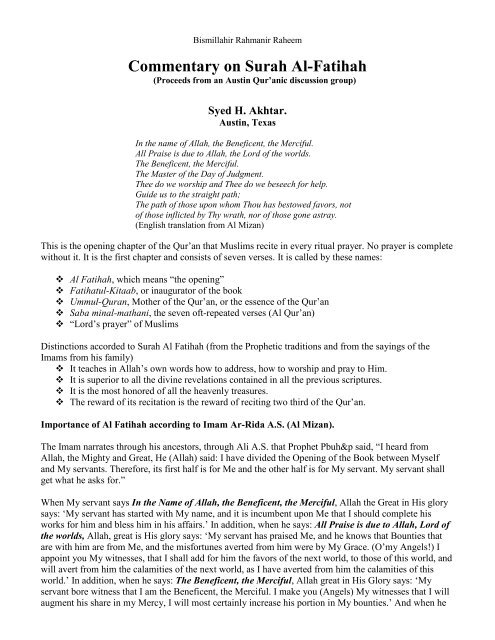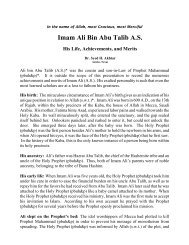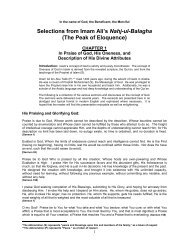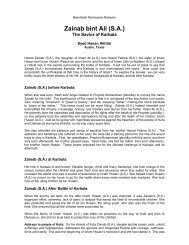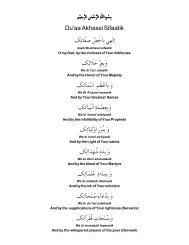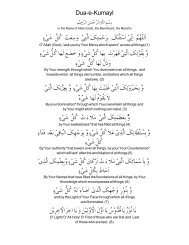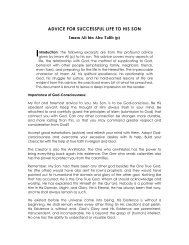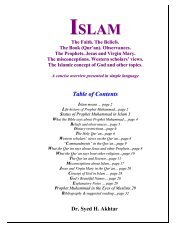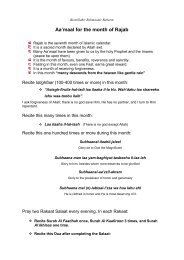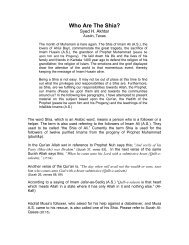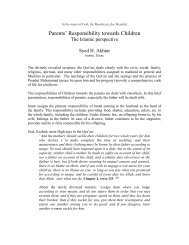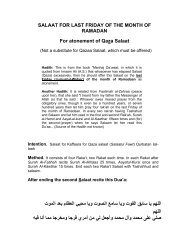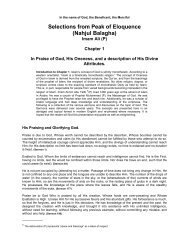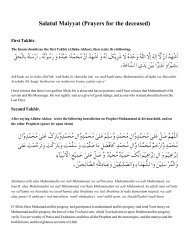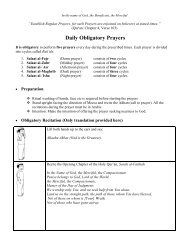Commentary on Surah Al-Fatihah - Islam
Commentary on Surah Al-Fatihah - Islam
Commentary on Surah Al-Fatihah - Islam
Create successful ePaper yourself
Turn your PDF publications into a flip-book with our unique Google optimized e-Paper software.
says, The Master of the Day of Judgment, <strong>Al</strong>lah the High says: ‘I make you My witness that as he hasacknowledged that I am the Master of the Day of Judgment, I will most certainly make his reck<strong>on</strong>ingeasier <strong>on</strong> the Day of Reck<strong>on</strong>ing, and I will most certainly accept his good deeds and overlook his sins.’ Inadditi<strong>on</strong>, when he says, Thee do We worship, <strong>Al</strong>lah the Mighty and Great says: ‘My servant is telling thetruth. He worships <strong>on</strong>ly Me. Be My witness that most surely I will give him (for his worship) a rewardthat will be the (object of) envy to all who opposed him when he worshipped Me.’ And when he says, andThee do We beseech for help, <strong>Al</strong>lah the High says: ‘From Me has My servant sought help, and in Me hehas taken refuge. Be My witness that I most certainly will help him in his affairs, and will aid him in hisdifficulties, and will take his hand in his calamities.’ And when he says, guide us to the rightpath…<strong>Al</strong>lah, Mighty and great is He, says: ‘This (part) is for My servant, and My servant shall have whathe asks for, and I have answered the prayer of My servant, and given him what he hopes for, and haveprotected him from what he is afraid of. (Uyunul-Akh’baar)The author of <strong>Al</strong> Mizan says that this chapter is especially for the purpose of worshipping <strong>Al</strong>lah and noother chapter of <strong>Al</strong> Qur’an comes close to it in this respect. This divine revelati<strong>on</strong> has been sent asthough, <strong>on</strong> behalf of the servants of <strong>Al</strong>lah, to teach them the manners of servitude, to show them how topraise their Lord, and how to declare their allegiance to Him in <strong>Al</strong>lah’s own words.In spite of its brevity, it c<strong>on</strong>tains all the Qur’anic wisdom, which may be summarized in four fundamentaltopics of truth: 1. The Oneness of God. 2. The Prophet-hood 3. The Resurrecti<strong>on</strong>. 4. The DivineGuidance (Leading to Bliss in the Hereafter).<strong>Al</strong>lamah Tabatabai says that the correct way of interpretati<strong>on</strong> of the Qur’an is from theQur’an itself, with additi<strong>on</strong>al help of the true teachings of the Prophet and the Imamsfrom his household pbuh&p. Other methods are defective and not acceptable to him. Hecalls them “misinterpretati<strong>on</strong>s.”Bismillahir Rah’maanir Raheem. The full import of this verse would be as follows: The guidance(total guidance) is begun with the name of <strong>Al</strong>lah, the Beneficent, the Merciful. He is <strong>Al</strong>lah, to whom theservants turn to. He is Beneficent, Who has opened the way of His all-encompassing Mercy that isnecessary for their existence, for the believers and n<strong>on</strong>-believers alike. He is Merciful, Who has reservedHis special Mercy for the believers, which ensures their happiness in the Hereafter. <strong>Al</strong>lah says: “and (asto) My Mercy, it embraces everything. Therefore, so<strong>on</strong> I will ordain it (particularly) for those whosafeguard themselves (against evil) with full awareness of divine laws (Yat’taqo<strong>on</strong>a), and pay Zakaat, andthose who believe in Our signs.” 7: 156. Thus, this explanati<strong>on</strong> places this first verse in the framework ofthe whole Qur’an, of which it is the first and opening sentence.This beginning also implies that the servant of <strong>Al</strong>lah says: “In Thy name do I pledge my servitude toThee.”Agha Puya says that beginning a work in the name of <strong>Al</strong>lah (Bismillah) dem<strong>on</strong>strates the following:A) The reciter acknowledges <strong>Al</strong>lah as his Lord and Master.B) He c<strong>on</strong>fesses his own helplessness.C) He believes in <strong>Al</strong>lah as ever Living, ever-Present, all Knowing, all Hearing, and <strong>Al</strong>mighty.D) He places reliance <strong>on</strong> <strong>Al</strong>lah al<strong>on</strong>e, seeking His Mercy and Pleasure.E) He dem<strong>on</strong>strates that when he calls up<strong>on</strong> the Beneficent and Merciful Lord, that <strong>Al</strong>lah will not denyhim of His Mercy.Traditi<strong>on</strong>s (quoted in <strong>Al</strong> Mizan):2
Prophet Pbuh&p always recited the first verse in the beginning of this <strong>Surah</strong>, as <strong>on</strong>e of the sevenverses of this <strong>Surah</strong>. Imam Rida A.S. said: In the name of <strong>Al</strong>lah means “I mark (brand) my soul with <strong>on</strong>e of the marksof <strong>Al</strong>lah.” Imam As-Sadiq A.S. said: “In the name of <strong>Al</strong>lah is nearer to the Greatest Name of <strong>Al</strong>lah (IsmeAzam), than is the iris of the eye from its white.” Imam <strong>Al</strong>i bin Husain A.S. says in his Dua of Friday: “In the name of <strong>Al</strong>lah” is the word of thosewho hold fast o Him, the speech of those who seek His protecti<strong>on</strong>.” (Sahifa-e-sajjadia)<strong>Al</strong>ham-du-Lillaahi Rab-bil A‘alameen. (Hamd means praise.)It implies praise of some<strong>on</strong>e for good by his own intenti<strong>on</strong> and from his own power. For example, topraise a pearl, the word Hamd will not be used, because its luster was given to it by some <strong>on</strong>e other thanitself. Therefore, <strong>Al</strong>hamduLillahi will be translated, as “<strong>Al</strong>l praise is due to <strong>Al</strong>lah (al<strong>on</strong>e)<strong>Al</strong>lah says in the Qur’an: “Who made good everything that He created.” 32:7“in Thy Hand is the Good; surely, Thou hast power over all things.” 3:26Every good and every beauty emanates from <strong>Al</strong>lah. Thus a praise for any good (deed) isin reality addressed to (and credited to) <strong>Al</strong>lah al<strong>on</strong>e.It is to be noted that <strong>on</strong>ly intelligent being are the <strong>on</strong>es that truly praise <strong>Al</strong>lah. Regarding Angels and othercreati<strong>on</strong>s, the Qur’an uses the term Tasbih or glorificati<strong>on</strong> followed by the term praise. “And angelsglorify their Lord with praise … 42:5. “Thunder glorifies Him and repeateth His praise” 13:13<strong>Al</strong>i A.S. is quoted to have said as follows: “We cannot know all the bounties of <strong>Al</strong>lah. They are bey<strong>on</strong>dour count and estimati<strong>on</strong>. So, we say <strong>Al</strong>hamduLillah, which means all Praise is for <strong>Al</strong>lah.”Ar-Rah’maanir Raheem. Discussed above.Ar-Rabb. It is translated as 'the Lord, the Master, or the Owner.'<strong>Al</strong>lamah Tabatabai gives the example of our limbs. We are the owner and master of our limbs. They d<strong>on</strong>ot have an independent existence apart from us. We use them as we wish. Similarly, <strong>Al</strong>lah is our owner.<strong>Al</strong>-A’alameen. It means the whole creati<strong>on</strong>, the universe. Therefore, Rabbil A’alameen implies theowner of the universe and every created thing.Maaliki Yaumid’deen. Master of the Day of the Judgment.Day’yaan means judge. Deen means the day of judgment. It also means religi<strong>on</strong>.<strong>Al</strong> Maalik is derived from <strong>Al</strong> Malik, which means possessor or owner. It also means Sovereign Lord orKing. Ad-Deen is the day of the Judgment.Iy’yaa ka Na’budu wa Iy’yaa ka Nas’ta-een. “Thee do we worship, and Thee al<strong>on</strong>e we beseechfor help.”3
Iy’yaaka means <strong>on</strong>ly You (emphasis). Ibaada means to worship. Ista’aana means to ask for help. Nas'taeenmeans ‘we ask for help.’The servant stands in fr<strong>on</strong>t of the Master for worship. The body and the soul are attentive. The master andthe servant, both are present. The Ownership is exclusive, and the servitude is exclusive. The plural ‘we”is used, perhaps implying that “I” carries the c<strong>on</strong>notati<strong>on</strong>s of egotism and self importance. The word“worship” by itself may imply that the worshipper may be independent, thus, the phrase ‘Thee do webeseech for help” immediately follows, indicating dependence of the devotee up<strong>on</strong> the Master.Imam As-Sadiq A.S. said this about the meaning of worship: “Worship is of three kinds; some peopleworship <strong>Al</strong>lah out of fear of Him - so, it is the worship of slaves. A group worships <strong>Al</strong>lah to seek reward -so, it is the worship of hirelings (Merchants, according to Hazrat <strong>Al</strong>i A.S. in Nahjul Balagha). A groupworships <strong>Al</strong>lah because of (His) love – and this is the worship of noble pers<strong>on</strong>s, and it is the excellentworship. (<strong>Al</strong> – Kafi)Ih’dinas-Siraatal Mus’taqeem. “Guide us to the straight path.”There are more than <strong>on</strong>e path. Straight path is for those who believe, and are not arrogant to worship<strong>Al</strong>lah, and worship Him al<strong>on</strong>e. <strong>Al</strong>lah says in the Qur’an: “Did I not enjoin <strong>on</strong> you, O’ children of Adam!That you should not worship the Satan. Surely, he is your open enemy. And you should worship Me, this isthe straight path.” 30:60-61. So, there is a straight path, and there is another path. According to <strong>Al</strong>lamahTabatabai, there are ways that are less than the straight path. He calls them “ways.” He quotes this verseto support his viewpoint; “Indeed, there has come to you a light and a clear book from <strong>Al</strong>lah, with it<strong>Al</strong>lah guides them who follow His pleasure, into the ways of safety, and brings them out of utter darknessinto light, by His permissi<strong>on</strong>, and guides them to the Straight Path.” 5:15-16. He c<strong>on</strong>cludes by saying thateither the ways are same as straight path or the other ways eventually merge into the Straight Path.There is a difference between ways and the Straight Path. <strong>Al</strong>lah says: “And most of them do not believe in<strong>Al</strong>lah without associating others (with Him). 12:106. Thus Ways may co-exist with some form ofpolytheism. However, the Straight Path is free of such things. It leads to <strong>Al</strong>lah, the destinati<strong>on</strong>,unc<strong>on</strong>diti<strong>on</strong>ally.<strong>Al</strong>lamah Tabatabai makes following points:1. There are various ways to <strong>Al</strong>lah. They differ in perfecti<strong>on</strong>, smoothness, depending up<strong>on</strong> factorslike; way of submissi<strong>on</strong> and worship, degree of submissi<strong>on</strong>, purity of intenti<strong>on</strong>, humility,knowledge, etc. <strong>Al</strong>lah says this: “And for all are grades according to what they did, and so thatHe may pay them back fully their deeds, and they shall not be dealt with unjustly.” 46: 12. The Straight Path c<strong>on</strong>trols all the ways. The people of the Straight Path do enjoy authority toguide the other servants of <strong>Al</strong>lah. <strong>Al</strong>lah says: “Verily, your <strong>on</strong>ly Master is <strong>Al</strong>lah and His apostle,and those who believe, those who keep up prayer, and pay Zakat while they are bowing down (inRuku). 5:55 This verse was revealed for <strong>Al</strong>i A.S. The people of Straight Path are higher in rankthan the others. Their path is superior to the others ways because of their knowledge of the DivineAttributes.3. Guidance (Hidaya). It means showing the way to the destinati<strong>on</strong>. The act of Guidance isexclusively reserved for <strong>Al</strong>lah. <strong>Al</strong>lah says in the Qur’an: “Therefore, to whomever <strong>Al</strong>lah intendsthat He would guide him aright, He expands his breast for <strong>Islam</strong>. 6:125. The guidance is of more4
than <strong>on</strong>e kind. (A) To some<strong>on</strong>e who strives in the way of <strong>Al</strong>lah. (B) To some<strong>on</strong>e who strives for<strong>Al</strong>lah. According to <strong>Al</strong>lamah Tabatabai these are two different situati<strong>on</strong>s. <strong>Al</strong>lah says: “And (asfor) those who strive hard for Us, We will most certainly guide them unto Our ways; and <strong>Al</strong>lah ismost surely with the doers of good.” 29:69Hazrat <strong>Al</strong>i A.S. is quoted to have said: “The straight path in this world is that which stops short ofexcesses, and rises above shortcomings and remains straight; and in the next world, it is the path ofthe believers (leading them) to the Garden.” (Ma’anil Akhbaar).Siraatal Ladeena An-am-ta <strong>Al</strong>ai-him, Ghair-il Magh’doobi <strong>Al</strong>ai-him Walad’Da’alleen.“The path of those up<strong>on</strong> whom Thou have bestowed favors, not of those inflicted by Thywrath, nor of those g<strong>on</strong>e astray.”Every straying is polytheism, and vice versa. <strong>Al</strong>lah says: “… and whoever adopts unbelief instead offaith. He indeed has g<strong>on</strong>e astray from the right way.” 2:108Who are “Anam-ta <strong>Al</strong>ai-him?” (Those <strong>on</strong> whom favors are bestowed). <strong>Al</strong>lah says: “And all who obey<strong>Al</strong>lah and the Messenger (Muhammad) are with those up<strong>on</strong> whom <strong>Al</strong>lah has bestowed favors, of theProphets, and the Truthful, and the witnesses, and the Righteous; and excellent are these ascompani<strong>on</strong>s!” 4:69“Magh’doobi” means, <strong>on</strong> whom is “Ghadab” Wrath (of <strong>Al</strong>lah). The <strong>on</strong>es <strong>on</strong> whom wrath of <strong>Al</strong>lahdescends are the <strong>on</strong>es persistent in disbelief or they are hypocrites. <strong>Al</strong>lah says: “He, who disbelievesin <strong>Al</strong>lah after he has believed, and opens his breast for disbelief, will suffer the wrath (Ghada-bun) of<strong>Al</strong>lah.” 16:106. These are worse off than the Da’al-leen.“Da’al-leen” are those who have g<strong>on</strong>e astray. It is the plural form derived from the root word “Dalla”which means to err, to wander away, or to go astray.[The End]References:- 1.) <strong>Al</strong> - Mizan (English) by <strong>Al</strong>lamah Sayyid Muhammad Husayn at-Tabatabai. 2.) The Holy Qur’an,translati<strong>on</strong> and commentary by Aqa Mirza Mahdi Puya. 3.) Tafseer-e-Namo<strong>on</strong>a. (Urdu) by Ayatullah NasirMakaram Shirazee.Food for thought. The Qur’an is the word of the infinite, revealed for the benefitof the finite, the humankind. The higher level of understanding is bey<strong>on</strong>d thereach of most us, except those blessed with divine knowledge, the Prophet and hispurified progeny (pbuh&p). A knowledgeable and well-respected friend stated tome that Siraatal Mus’taqeem is not a mere “highway” or a set of rules or a set ofbeliefs leading to <strong>Al</strong>lah; it may also signify a higher spiritual path to c<strong>on</strong>nect with<strong>Al</strong>lah swt.Before studying the Qur’an, let us pray; “O’ <strong>Al</strong>lah, grant us knowledge andunderstanding of Your Book. We acknowledge our ignorance and shortcomings.”--------------------------------------------5


